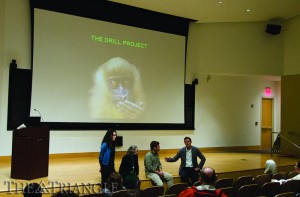An exclusive screening of “The Drill Project” premiered at Drexel University April 15. The 50-minute documentary attracted approximately 200 viewers to Mitchell Auditorium, exposing a foreign concern that Drexel has made its own since the project’s start in 2011.
The Drill Project focuses on the largest primate found on Bioko Island in Equatorial Guinea: Mandrillus leucophaeus, or the drill monkey. The drill is a rare, endangered species due to illegal bush meat hunting that many families and merchants on the island have grown to rely on.
The Drill Project strives to raise global awareness about conservation efforts by presenting research through media and film outlets. They have been collaborating with the Bioko Biodiversity Protection Program, Drexel and the University of Equatorial Guinea to produce and promote the documentary.
Prior to the screening, Dean Donna Murasko of the College of Arts and Sciences introduced “The Drill Project” and its team members. She emphasized the crucial role that researchers play in advocating for those who cannot do so themselves. Specifically, she mentioned people on Bioko Island and their lack of media skills.
“This documentary isn’t meant for us in this audience. It’s meant for them. They couldn’t do it themselves. They’re not videographers; they’re not editors,” Murasko said. “This project tonight is a vision to educate the people on Bioko Island in Equatorial Guinea about the resources they have.”
Shaya Honarvar, a research associate at Drexel, presented a 10-minute prefatory video to provide background information on Bioko Island and the drill monkey.
Honarvar and Gail Hearn, director of BBPP and a research professor at Drexel, work together at BBPP. In 2010, Honarvar and BBPP volunteer Justin Jay began looking for footage of the drill while studying sea turtles on Bioko Island.
“We chose to work with the drill monkey and have that as an icon because it is a pretty big and impressive-looking animal. The idea is to use this species as an umbrella species to protect all wildlife on Bioko Island,” Honarvar said.
The project aims to provide Equatorial Guinea’s population with exclusive footage of drill monkeys and other Bioko wildlife. This can increase awareness, education and incentive for Bioko Island residents to protect their ecosystem. The consequences of the bush meat trade are emphasized while the importance of wildlife and its preservation is glorified.
“Our mission is not only to conduct scientific research but also to provide educational resources,” Honarvar said.
Although hunting the drill is outlawed, Equatorial Guinea has demonstrated sporadic and infrequent interest in monitoring the trade. Notably, hunting rates temporarily decreased each time regulation attempts were made, only to spike shortly after governmental presence disappeared.
“Local markets sell meats at lower prices, and local people are becoming increasingly prosperous,” Honarvar said. “BBPP has been monitoring the status of Bioko Island wildlife both in the market and in the forest for the past 15 years.”
Honarvar showed a graph demonstrating the pattern, stressing that the pattern demonstrates that the government of Equatorial Guinea can make an impact on bush meat trading.
To maintain authenticity, Drexel screened the Spanish version of the documentary, “El Proyecto del Mono Dril,” leaving English-speaking viewers to rely on subtitles. Equatorial Guinean Demetrio Bocuma Mene, a graduate student at Drexel, narrated the film in “local” Spanish.
A former film student at Drexel, Megan Pollin, also worked on the film, serving as the film editor for “The Drill Project” as one of her co-op positions.
“I think it’s great Drexel reaches out to places in the world like Bioko Island that are often overlooked and then extends those opportunities to students,” Juliana DeMarici, a senior biomedical engineering major, said.
When asked about the screening, senior marketing major Zach Cohen described it as “surprisingly touching.” He said he “honestly did not expect a documentary about monkeys to be so engaging. It didn’t help that they were adorable.”
The screening concluded with a question-and-answer session with the film’s team.
Drexel’s screening of “The Drill Project” is the film’s first showing in the United States. The film is currently airing on Equatorial Guinea TV and will be screened globally throughout the next year.
To learn more about “The Drill Project,” visit www.TheDrillProject.org.


